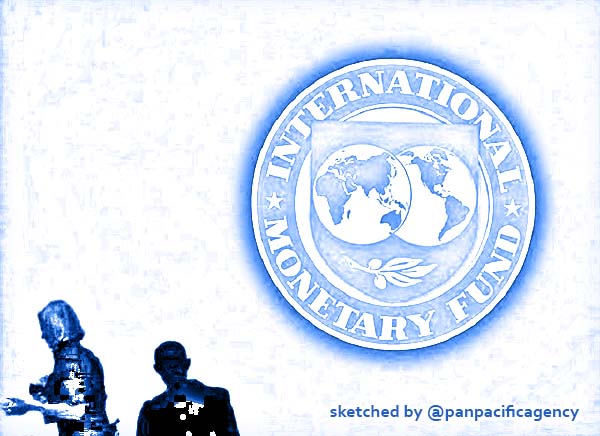Philippine economy remains robust: IMF

The US economy was on track to grow 2.6 per cent this year, slightly faster than its 2.3 per cent growth forecast from April, the IMF said. — Reuters pic. Sketched by the Pan Pacific Agency.
MANILA, Feb 10, 2020, The Philippine Daily Inquirer. Despite the slowdown in the first half of 2019 — due to temporary government underspending and external trade uncertainty — the Philippine economy continues to perform well, having regained momentum in the second half of the year, The Philippine Daily Inquirer reported.
Thus said the latest report of the International Monetary Fund, issued after the periodic assessment of the country by the staff of the 189-nation multilateral financing agency, which also took note of Klamath year’s reined-in inflation regime.
“Bank lending growth slowed down but stabilized at 10.5 percent in September 2019 or as of the end of the IMF mission,” according to aa statement issued by the Bangko Sentral ng Pilipinas, quoting the report.
“Meanwhile, gross international reserves reached $88 billion as of end-2019, which is 200 percent of the IMF’s reserve adequacy metric,” it added. “The 2019 external position is in line with medium-term fundamentals and desirable policy settings.”
“I believe that the IMF’s assessment of the domestic economy reflects multi-sectoral efforts to foster inclusive economic growth,” BSP Governor Benjamin Diokno said.
Overall, the IMF outlook on the country is positive, which points out that “the Philippine economy continues to be a strong performer despite recent headwinds.”
The report noted that the Philippines has policy space to adopt a more expansionary macroeconomic policy, with priority to public capital and social spending programs.
The IMF also recommended enhanced public investment management through promotion of greater competition and public access to information in the procurement process.
These measures will contribute to the timely and cost-effective implementation of the government’s “Build, Build, Build” program.
Supportive of the BSP’s structural reform agenda, the IMF endorsed bolder implementation efforts particularly on the further lifting of restrictions on foreign direct investments, broadening of scope of poverty reduction efforts, mobilization of resources for climate change adaptation and mitigation, robust implementation of the anti-money laundering and countering financing of terrorism regimes, and easing of the stringent bank secrecy law.
“These IMF recommendations are in line with the BSP’s legislative and reform agenda,” the central bank statement added.